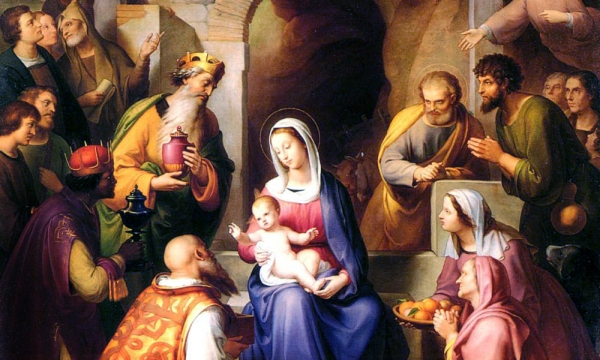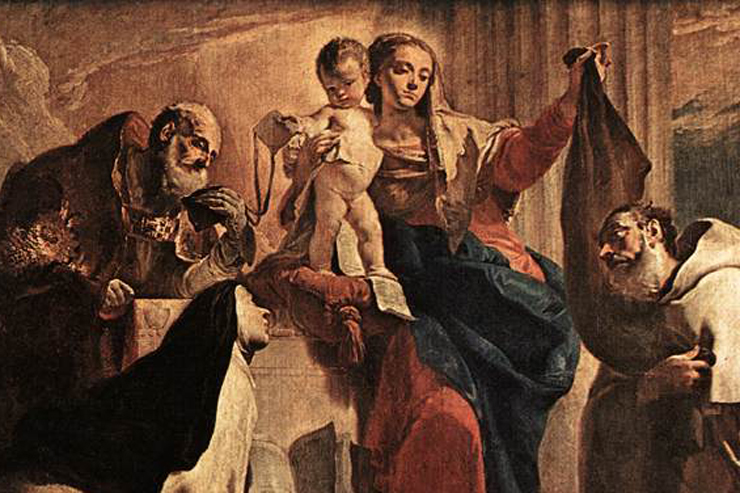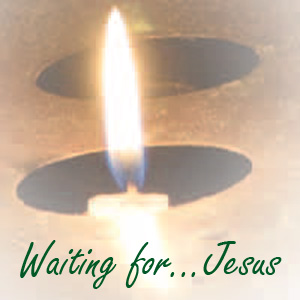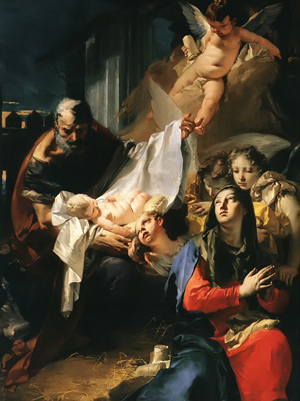
Detail of "The Nativity" by Rohden Franz von Geburt Christi
We have heard the story of the Epiphany — the manifestation of Christ to the Gentiles represented by the wise men — so many times that the truly remarkable aspects of it, and their meaning, can be lost on us. That’s why today I would like to focus on three aspects of the account of today’s Gospel, so that we can look at them with fresh eyes, with a fresh heart, and receive from them crucial lessons that will help us live our faith more fully now. I’ll focus first on the Star, second on Herod and third on the wise men and the gifts they brought.
The Star
In order to grasp the importance of the star, we need to understand two things about the ancient world.
- The first is the importance of stars. The ancients, particularly in the deserts of the Middle East and on the seas, did not have compasses like we do, or highway signs telling us “60 miles to Boston.” They were highly dependent on the fixed stars in the sky as references for their direction. They firmly believed that God had made them this way for that reason. Whenever anything happened in the sky that was new — like the appearance of a comet, or meteor shower, or a planet’s or star’s shining more brightly — the ancients thought that it had to bear some message from God, the creator of the heavens and the earth. So they studied the heavens, because in studying the heavens they were seeking the message of God.
- The second thing about the ancient world that we have to be aware of is that there were prophecies outside of Israel, from women called Sybils, that heralded the future birth of a King in Israel who would be king of all. One of these Sybilline prophecies predicted that the birth of the king would be preceded by a sign in the heavens. This was the context in which the wise men would have been looking into the heavens. When they saw the star at its rising, they not only interpreted that God was trying to communicate something to them in general, but that God was specifically heralding the birth of the newborn King in the east, who would be a universal king.
Led by the star, and their faith in its meaning, the wise men went on a journey toward the Holy Land. We don’t know how long their pilgrimage took, but the Gospel gives us indications that it wasn’t short. After Herod asked them the exact time of the appearance of the star, and then, a short time later, after they did not return to him, he proceeded to kill every boy in Bethlehem under two. So the time of their preparation and journey probably took 18-24 months. Yet they came. Whether they walked or had the help of animals, we don’t know. But they went on a journey of more than a year because they knew God was speaking to them through the star.
That they came to Jerusalem shouldn’t be a surprise. The distance between Bethlehem and Jerusalem is only six miles; as they were following the star, it’s very likely that they would have thought that the star was coming to rest on the important capital of the Jews rather than over a small village close by. Moreover, they probably thought that the newborn King of the Jews would be the son of the present king of the Jews, and so it’s logical that they would want to meet Herod.
They received an audience and told Herod the story about why they had come so far to adore a child to whom God in the heavens was testifying by means of this star. Herod called all his experts around him and asked where this universal king was to be born. From the book of the prophet Micah, they told him that he was to be born in Bethlehem of Judea. Then something happened that we really shouldn’t miss: only the Wise Men left. None of the experts around Herod, who knew the Scriptures inside out, were curious enough to make the short journey, even though the wise men, who had already journeyed more than a thousand miles, left with zeal. Herod feigned an interest in seeing the child, but he was only trying to deceive the Magi so that he could kill him; the experts seemed to have no fire to discover whether it might be true that the Messiah was only a short distance away.
What does this mean for us?
Sometimes it’s those who travel great distances who are hungriest to continue the journey of faith. In Catholicism today, we’re buoyed by the incredible fire of so many converts from Protestantism, including so many Protestant ministers, several hundred of whom have come into the Church in the past decade. Even in the midst of several difficult years for the Church, they’re still coming. And many of them who do enter want to give their whole lives to God in service to his Church. In many ways, they’re the modern wise men. On the other hand, many who have been Catholics for their whole lives often times can act like Herod’s experts, pointing out the truths of the Bible or of the faith, but not really living the faith with a searching hunger for God. Chaplains at Catholic colleges and universities often note that some who know their faith very well can begin to think they “know it all,” that they’ve somehow “graduated” from the need to practice it, and stop practicing it altogether. Sometimes even priests, who have received a great education in the faith, can lose their piety — and their people obviously suffer.
But for this analogy to hold, we have to ask where the star pointing out Christ’s presence is still burning. Obviously God is not calling us to walk for 18-24 months to ancient Palestine, but he does call us to follow the indicators of his Son’s presence. The star continues to burn in several places, of which I’ll mention three:
- The first is in the red flame of the tabernacle lamp. The star of Bethlehem burned pointing and attracting to the presence of the Son of God. The tabernacle lamp burns pointing to the presence of that same Jesus. The question we need to ask ourselves this great feast day is how zealously we follow that star. The Wise Men traveled for months at great sacrifice to come and adore the Lord. How much are we willing to do to come to Mass or to come to adore him in the Blessed Sacrament?
- The second place the star continues to burn is in the light of the confessional, which heralds the presence of Christ acting through the ministry of one of his chosen priests in the sacrament of God’s mercy. Christ is truly present there, doing what he came from heaven to be born as a child in order to die to bring about: the forgiveness of sins. We sing the reality of Christ’s forgiveness in so many of our beautiful Christmas hymns. “Hark! the herald angels sing, Glory to the Newborn king. Peace on earth and mercy mild, God and sinners reconciled. ” “O holy Child of Bethlehem, Descend to us, we pray; Cast out our sin and enter in, be born in us today.” But, again, we have to ask ourselves how well we’re following that star.
- A third place the star burns — or at least is supposed to burn — is in each of us. On the day of our baptism, our Godfathers lit our baptismal candles from the Easter Candle, which is the symbol of Christ the Light of the World. We were instructed by the priest who baptized us in Christ’s name to “keep that light burning brightly.” We’re called to reflect Christ’s light so that others in seeing this light might come to Christ, its source. We are supposed to be stars — drawing others toward the presence of Christ within us through grace, drawing others to follow our footsteps to the Eucharist, to the confessional, to the faith. But the question is: are we still burning with the light and the warmth of that rising star?
We turn now to Herod
Herod was one of the most talented leaders the ancient world had ever seen. A great organizer and builder, he built all types of roads and public works and constructed the Second Temple in Jerusalem, the one which lasted until the Roman’s destroyed it in 70 AD. As talented as he was, however, he had an extraordinarily serious flaw, one that led him eventually to doing awful things: he wanted to be in control so much that he ended up committing great atrocities. He, who started off as a very religious king, ended up killing three of his own sons, whom he thought were looking a little too forward to eventually being kings themselves.
We know what he did in order to try to kill Jesus: he massacred every boy under two in a whole geographical area. He became a mass murderer of the young and innocent rather than lose control over his kingdom. (Little did he know that Christ was not coming to take his job, but to found the kingdom of heaven).
And at the end of his life, we see even more of the decay that was corroding his soul. Herod knew that people would celebrate rather than mourn his death and that thought filled him with rage. So he asked his advisors to prepare him a list of the most beloved people in and around the Holy City. They didn’t quite know then why he made this request; maybe, they thought, he was trying to ingratiate himself with popular people to make himself more popular. After he had reviewed the list, he told his soldiers to round them up and put them in prison. And as his death approached, he gave orders that, on the moment he breathed his last, every single one of them be slain. “They might not mourn BECAUSE of my death,” he said, “but they would at least cry AT my death.” This was a man who, fearing not being in control of everything became capable of such great evil.
What do we learn from the life of Herod that can help us in our own lives?
We learn the incredible depths to which a human being can fall once he lets his fear of losing control over his life start to consume him and once he begins to make compromises with the moral law. Herod didn’t start by terrible acts of mass murder. His fall from the devout religious observance of his youth began in little ways, when he resented not being in control around the house, with his family, with those around him. He stopped practicing the Jewish faith. He stopped going over to the temple he built to pray. He started to have concubines, women who weren’t his wives. He started to look on his temporal kingdom as the treasure worth sacrificing everything and everyone to maintain, rather than on God and his commandments as the true treasure. Little by little, all of these sins propelled him on the way of becoming the murderous tyrant he turned out to be.
The same thing happens with us, too. The great saints have said that “venial sins prepare us to commit mortal sins.” And mortal sins become contagious and can become more serious with time, because every time we say, “MY will, not thine, be done,” we become more capable of horrific sins.
We see this in the case of the 1.4 million abortions that occur in our country each year, which is a modern day slaughter of the Holy Innocents. Every 23 seconds, an American mother allows her innocent child growing within her to be killed; over the course of this homily, a staggering 50 children will be killed through abortion in our country alone. How do mothers become capable of making such a choice? It’s not that they are evil. But oftentimes it began with previous sinful choices, as we see in the life of Herod.
Women who are dealing with the pain of post-abortion trauma often cite that it began with a fear of losing control over their life if the child were to be born. Others add that it began with the sin of sex outside of marriage and an irresponsible lifestyle. Some married women who have had abortions say that it began with the sin of contraception in marriage, in which the couple was already saying “no” to the child in the very act made by God to say “yes” to the possibility of a child. Many say the decision was preceded by their gradual distancing from the practice of the faith.
Whatever the individual cases may be, the point that we see in the life of Herod and in modern life is that sin — even those sins we might consider small — separates from God, and the longer we stay in separation, and the more we act out of a sinful habit and push ourselves away from God, the more likely it is that we can become capable of horrible sins like Herod.
What is the antidote to this type of Herodian pattern?
We see it clearly in the Wise Men
They were wise, because they were searching for God, even when his signal was faint. They were wise because they were hungry to make the Lord’s wisdom their own. They were wise because they knew that whatever sacrifices they made — even giving up probably three years of their life for the round-trip pilgrimage to Bethlehem, at great personal cost — was a small price to pay in order to find the Lord. They were wise because when they found him in a manger, they gave him the best and most costly gifts they had: gold, frankincense and myrrh. And they were wise because they realized that not even that was enough.
Their greatest gift to their infant savior came when they dropped to their knees and gave him their hearts in adoration. The antidote to becoming like Herod is to become like the wise men, to have a hunger to make whatever sacrifices necessary to search for and find God, to follow the star that continues to burn, to base our lives on his wisdom, to be generous with God and give to him who has given us everything the best we have. The remedy is to adore Christ in all our actions.
The same Jesus who was placed in the manger will soon be placed in your mouths or in your hands. The Eucharist is the pearl of great price, worth selling everything we have to obtain. The Mass is the continual manifestation of God, the on-going Epiphany. It is the new Bethlehem. This is where the new wise men and women, young and old, come with joy. This is where the new wise men and women depart, “by another way,” far away from Herod, changed by Christ forever.
Father Landry is pastor of St. Anthony of Padua in New Bedford, MA and Executive Editor of The Anchor, the weekly newspaper of the Diocese of Fall River. The above article is from his 2006 homily on the Solemnity of the Epiphany at his parish.
Please help us in our mission to assist readers to integrate their Catholic faith, family and work. Tell your family and friends about this article using both the Share and Recommend buttons below and via email. We value your comments and encourage you to leave your thoughts below. Thank you! – The Editors














